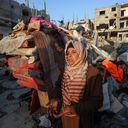Palestinians in Gaza "living a disastrous life" after 100 days of war

The growing risk of famine, shortages of clean water and medicine, and unsanitary conditions in Gaza are increasing fears after 100 days of war that hunger, disease and dehydration could begin to kill just as many — if not more — Palestinians than Israel's military campaign.
The big picture: More than 23,900 Palestinians — 70% of whom were women and children — have been killed in Israel's relentless bombardment and ground offensive that began after the Oct. 7 Hamas attack, according to the Ministry of Health in Hamas-run Gaza.
- Thousands more could die if humanitarian conditions aren't drastically improved, aid groups and Palestinians warn.
- "Gaza is going through a period of great hardship ... [and] an unprecedented period. And because of that, people here are paying a truly exorbitant price, and are living a disastrous life," Al Jazeera journalist Wael Dahdouh, who is from Gaza, told a pro-Palestinian rally via video in Washington, D.C., on Saturday.
- "People do not have sustenance, food, or drink, a place to sleep, a bathroom and what is necessary for life — not for a decent life, rather what is basically necessary to maintain life," said Dahdouh, whose wife, two sons, daughter and grandson were killed in Israeli airstrikes.
Driving the news: The fighting, Israel's bombardment and the resulting mass destruction have displaced more than 1.9 million Palestinians — about 85% of the population — putting enormous pressure on the Strip's already stressed humanitarian and hospital systems.
- Israel allows only a limited amount of humanitarian aid into the Strip, worsening conditions across the tiny enclave. Just 178 aid trucks entered Gaza on Friday. Before the war, an average of 500 trucks crossed into the Strip daily.
- "Providing humanitarian assistance across Gaza is almost impossible," UN aid chief Martin Griffiths told the Security Council on Friday.
Hunger has set in and the risk of famine is increasing every day, a UN-backed body warned last month.
- Gaza's entire population — more than 2.2 million people — is facing crisis or worse levels of hunger, concluded a report by the multi-partner body known as the Integrated Food Security Phase Classification (IPC), which monitors global hunger.
- Meanwhile, clean drinking water is scarce.
Zoom in: These realities have made conditions ripe for the spread of infectious diseases.
- More than 100,000 cases of diarrhea and 150,000 cases of upper respiratory infection, and numerous cases of meningitis, skin rashes, scabies, lice and chickenpox have been reported since mid-October, the World Health Organization said late last month.
- Hunger and dehydration make it harder for the body to fend off such diseases, increasing fears many more will die from lack of treatment.
- Noncommunicable diseases — like kidney disease, diabetes and hypertension — are also killing people who "would have otherwise been able to survive had they had access to their medications," said American doctor Seema Jilani, who recently returned from Gaza after working at the Al-Aqsa Hospital.
What they're saying: Jilani described the horrific scenes she saw in Gaza: children with severe burns; patients enduring treatment without pain medications; and emergency rooms operating without gauze.
- One young girl Jilani treated had fourth-degree burns. "Her entire face and upper neck were charred black," said Jilani, who traveled to Gaza with the International Rescue Committee (IRC). "The room smelled of burnt flesh. It's a smell that is indelible in my brain forever."
- Jiliani, who has worked in many conflict areas, said the situation in Gaza is unique in that the "systematic dismantling of health care infrastructure" has been almost normalized.
- In war zones, people typically think of "cities falling — the 'fall of Kabul,' or the 'fall of Mosul' or the 'fall of Saigon' — and how we're speaking of this war now is the fall of hospitals."
- There have been hundreds attacks on health care since the war began, according to the WHO. Only 15 of the enclave's 36 hospitals are open, and they face severe shortages of personnel, beds, medicine, other medical supplies.
- "I'm deeply appalled that we're having to defend life-saving medical care," Jilani said.
What to watch: Israel has defined victory as securing the release of the hostages abducted by Hamas and completely crushing the militant group to ensure an attack like the one on Oct. 7 — which Israeli officials say killed 1,200 people, mainly civilians — can never happen again.
- Israeli leaders have warned of a long war — and fears are mounting the fighting could expand into a wider regional conflict. For Palestinians, that undoubtedly means more suffering.
- "People will continue to suffer and die from the rockets, the bombs, the missiles and the bullets; and in increasing numbers from starvation, disease and exposure," the UN's Giffiths said Friday.
- "What we have seen since Oct. 7 is a stain on our collective conscience. Unless we act, it will become an indelible mark on our humanity," he added.
Go deeper: 100 days of war in Gaza — in photos